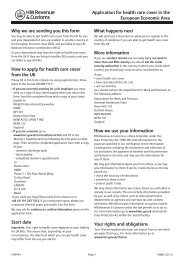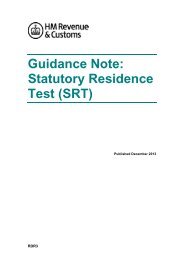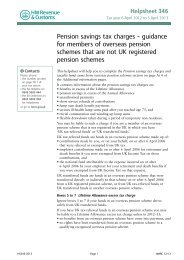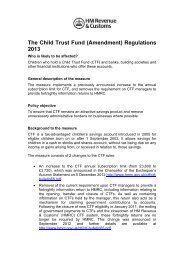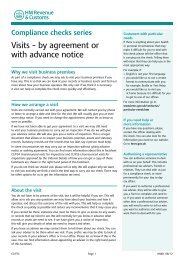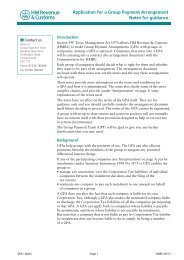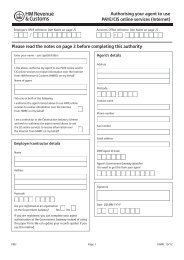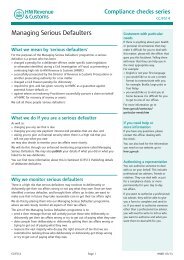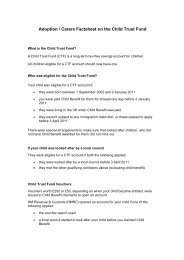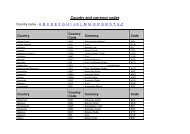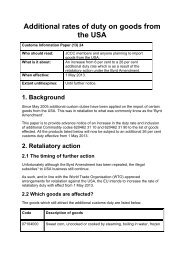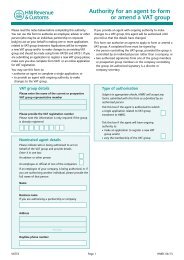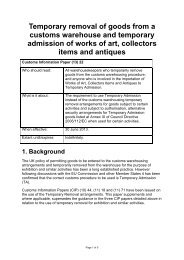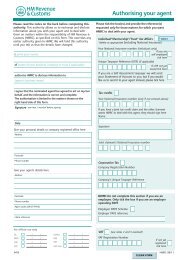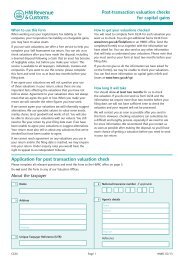IHT400 Notes : Guide to completing your Inheritance Tax account
IHT400 Notes : Guide to completing your Inheritance Tax account
IHT400 Notes : Guide to completing your Inheritance Tax account
Create successful ePaper yourself
Turn your PDF publications into a flip-book with our unique Google optimized e-Paper software.
What value <strong>to</strong> use<br />
Estimating a value<br />
S<strong>to</strong>cks and shares<br />
<strong>IHT400</strong> <strong>Notes</strong><br />
<strong>Guide</strong> <strong>to</strong> <strong>completing</strong> <strong>your</strong> <strong>Inheritance</strong> <strong>Tax</strong> <strong>account</strong><br />
How <strong>to</strong> value the assets —<br />
for <strong>Inheritance</strong> <strong>Tax</strong> (IHT) purposes<br />
use the open market value of<br />
an asset<br />
The open market value is the price the asset might reasonably fetch if<br />
it was sold on the open market at the time of the transfer. This represents<br />
the realistic selling price of an asset, not an insurance value or<br />
replacement value.<br />
You should be able <strong>to</strong> value some of the estate assets quite easily,<br />
for example, money in bank <strong>account</strong>s or s<strong>to</strong>cks and shares. In other<br />
instances, you may need the help of a professional valuer. If you do decide<br />
<strong>to</strong> employ a valuer, make sure you ask them <strong>to</strong> give you the<br />
‘open market value’ of the asset.<br />
If you do not know the exact amount or value of any small item, such as an<br />
Income <strong>Tax</strong> refund or household bill, do not put off applying for a grant or<br />
confirmation just because you do not know the exact figures. You may use<br />
an estimated figure.<br />
Do not guess at a value, but try <strong>to</strong> work out an estimate based on the<br />
information you have.<br />
If you are including an estimate, enter details of the estimated values in<br />
the declaration on page 12 of form <strong>IHT400</strong>.<br />
How <strong>to</strong> value s<strong>to</strong>cks and shares<br />
You do not have <strong>to</strong> get a professional valuation for quoted s<strong>to</strong>cks and<br />
shares. You can value shares quoted on the London S<strong>to</strong>ck Exchange by<br />
finding the price of the shares in the financial pages of a newspaper.<br />
First of all, make a list of all the shares, including the name, nominal value<br />
and types of shares – for example, ‘A N Other Plc 10p ordinary shares’.<br />
Then, if you are using a newspaper, find the shareholding and enter the<br />
price given for each shareholding. To find out the value of the shares,<br />
multiply the number of shares by the price given. So, if the deceased<br />
held 1,250 shares and the price was 1093.5p, the value for the holding<br />
is £13,668.75.<br />
Sometimes, for unit trusts, the newspaper may show two prices, take the<br />
lower one.<br />
Take the value of the shares on the day the person died – remember that a<br />
newspaper printed on the day the deceased died will have share prices for<br />
the day before.<br />
65



